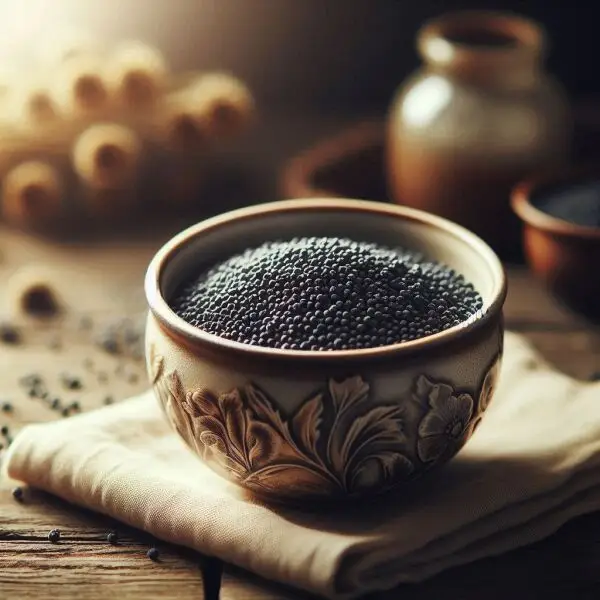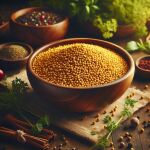Benefits of poppy seeds: how many should you consume per day?
Poppy seeds can be consumed because they are a great source of nutrients, fiber, and have powerful antioxidant properties....
Table of Contents
- Why talk about poppy seeds?
- Real benefits of poppy seeds
- How many poppy seeds can I eat per day?
- Quick ideas: How to include them in your diet?
- Can everyone eat them?
- Conclusion
Follow Patricia Alegsa on Pinterest!
Ah, poppy seeds! That crunchy and almost mysterious touch we find in breads, muffins, and even in some “fancy” smoothies. But are they just decoration? Not at all!
These little seeds have a lot to offer, and today I’m going to tell you straight (with a few jokes, because nutrition doesn’t have to be boring).
Why talk about poppy seeds?
First, because people tend to underestimate them. Who hasn’t scraped a poppy seed off a bun thinking it’s useless? Mistake. Poppy seeds are small, yes, but they carry an arsenal of benefits you can’t even imagine. And no, they won’t make you see pink elephants (sorry, Dumbo).
Real benefits of poppy seeds
1. Truly rich in nutrients
Poppy seeds provide calcium, iron, magnesium, and zinc. Yes, that quartet your body needs to keep bones strong, muscles fit, and an immune system that doesn’t give up at the first sign of a cold.
2. Fiber for intestinal transit
Having trouble with the bathroom? Here are your allies. A couple of teaspoons of poppy seeds can add fiber to your diet and help your intestines run like Swiss clockwork.
3. Good fats
Fat here is not the villain. Poppy seeds contain unsaturated fats (the ones that help your heart and don’t let cholesterol rise like foam).
4. Antioxidant power
Poppy seeds contain compounds that fight oxidative stress. Translation? They help slow aging and protect your cells. I won’t promise eternal youth, but at least you’re giving your cells a hand.
How many poppy seeds can I eat per day?
The million-dollar question! This is where many get confused. Although they’re healthy, you shouldn’t eat them like popcorn at the movies. One to two teaspoons a day (about 5-10 grams) is more than enough to enjoy their benefits. More doesn’t always mean better. If you overdo it, you might experience digestive discomfort, and nobody wants that.
What about myths? Can I get poisoned?
Let’s get to the point! Yes, poppy seeds come from the same plant used to make opium, but don’t worry. The seeds you buy at the supermarket don’t contain dangerous amounts of alkaloids. You’d have to eat kilos and kilos to notice any strange effect, and by then, you’d probably be bored first.
Quick ideas: How to include them in your diet?
- Sprinkle poppy seeds on yogurt, salads, or smoothies.
- Add them to bread dough, muffins, or cookies.
- Mix them with fruit and a bit of honey for a crunchy snack.
See? You don’t need to be a chef or scientist to take advantage of them.
Can everyone eat them?
In most cases, yes. But watch out: if you have seed allergies or digestive problems, it’s better to consult your doctor or nutritionist (raising my hand here!). And if you’re going for a drug test, check as well: although rare, they can slightly alter results in very sensitive tests.
Conclusion
Poppy seeds aren’t just decoration. They’re small but powerful. Add one or two teaspoons a day and your body will thank you. And if next time someone looks at you funny for putting poppy seeds on everything, now you have plenty of arguments.
Are you up for trying them this week? What dish would you add them to? Tell me, because there’s always something new to learn here!
Enjoy (in moderation) the wonders that fit in a teaspoon!
Subscribe to the free weekly horoscope
Aquarius Aries Cancer Capricorn Gemini Leo Libra Pisces Sagittarius Scorpio Taurus Virgo
-
 Colon cancer diagnosis is increasing in young people: ultra-processed foods under suspicion
Colon cancer diagnosis is increasing in young people: ultra-processed foods under suspicion
Colon cancer is increasing in people under 50: diet and ultra-processed foods under scrutiny. Experts warn: current habits increase the risk. -
 Discover the mosquito-repelling tree and its multiple benefits
Discover the mosquito-repelling tree and its multiple benefits
Discover the mosquito-repelling tree that improves health: a natural ally for your garden that also benefits the respiratory system and cosmetics. -
 Avoid these mistakes: Where NOT to store olive oil at home
Avoid these mistakes: Where NOT to store olive oil at home
Don't ruin olive oil: discover the ideal place to store it and preserve its flavor and nutritional benefits. Don't waste it! -
 How to prevent Alzheimer's: learn about the changes that can add years to quality of life
How to prevent Alzheimer's: learn about the changes that can add years to quality of life
Learn how to prevent Alzheimer's and add years of quality life! Discover what changes can help you stay healthy. -
 At 35, your body starts to lose strength: they reveal how to prevent physical decline
At 35, your body starts to lose strength: they reveal how to prevent physical decline
Does the body peak at 35? A 47-year Swedish study reveals that performance declines from then on, but staying active in adulthood improves it by up to 10%.
I am Patricia Alegsa
I have been writing horoscope and self-help articles professionally for over 20 years.
Subscribe to the free weekly horoscope
Receive weekly in your email the horoscope and our new articles on love, family, work, dreams and more news. We do NOT send spam.
Astral and numerological analysis
-
 Discover your future, secret personality traits and how to improve in love, business and life in general
Discover your future, secret personality traits and how to improve in love, business and life in general
-
 Online Dream Interpreter: with artificial intelligence
Do you want to know what a dream you had means? Discover the power of understanding your dreams with our advanced online dream interpreter using artificial intelligence that responds to you in seconds.
Online Dream Interpreter: with artificial intelligence
Do you want to know what a dream you had means? Discover the power of understanding your dreams with our advanced online dream interpreter using artificial intelligence that responds to you in seconds.
-
 Discover the fruit rich in vitamin C that helps you lose weight
Discover the fruit rich in vitamin C that helps you lose weight
Fruit rich in vitamin C and water, ideal for weight loss. Nutritionists recommend it to improve nutrition and strengthen the immune system. -
 The Pothos Plant: The Magnet for Good Energy Your Home Needs
The Pothos Plant: The Magnet for Good Energy Your Home Needs
Discover the plant that attracts good energy and prosperity: easy to care for, hardy, and perfect for your home. Learn its secrets and how to grow it. -
 Eggs for Breakfast: Nutritional Benefits and Risks
Eggs for Breakfast: Nutritional Benefits and Risks
Eggs for breakfast: rich in protein, vitamins, and minerals. Discover their nutritional benefits and how to adapt them to your personal needs. -
 5 ways to produce dopamine naturally according to science
5 ways to produce dopamine naturally according to science
Increase your dopamine naturally! Discover science-backed habits to improve motivation and well-being, from food to your daily routines. -
 Zinc and Vitamins C and D Supplements: Keys to Your Health
Zinc and Vitamins C and D Supplements: Keys to Your Health
Discover the best zinc, vitamin C, and D supplements to strengthen your health and prevent infections. Optimize your well-being today! -
 Discover the effects of quitting sugar: fatigue, anxiety, and benefits
Discover the effects of quitting sugar: fatigue, anxiety, and benefits
Discover the changes in your body when you quit sugar: fatigue, anxiety, and cravings at first, but soon you will enjoy benefits for your physical and mental health. -
 Plant-based milks are not as nutritious as cow's milk
Plant-based milks are not as nutritious as cow's milk
A study reveals that plant-based milks have fewer nutrients than cow's milk and contain potentially harmful components, although without significant risk. -
 What does it mean to dream of darts?
What does it mean to dream of darts?
Discover the meaning behind your dreams with darts - are you aiming at a target or fearing to be hurt? Find answers in our article! -
 Want to drink less alcohol? Experts warn that a soda may not be the best alternative
Want to drink less alcohol? Experts warn that a soda may not be the best alternative
Looking to cut back on alcohol? Experts suggest that soft drinks or sodas are not the best option. Discover healthier alternatives for your well-being. -
 Discover how to learn to be optimistic and live better: what are the benefits of a positive attitude?
Discover how to learn to be optimistic and live better: what are the benefits of a positive attitude?
Is it possible to learn to be an optimistic person? Discover how to live better and longer by being positive. Learn the secrets to become an optimistic person. -
 Find out how to know if your astrological sign is compatible with your partner's sign
Find out how to know if your astrological sign is compatible with your partner's sign
Do you want to know if your astrological sign is compatible with your partner's? Find out how astrology influences love and find out the compatibility between the two of you. Find out now! -
 Benefits of mustard seeds: how many should you consume per day?
Benefits of mustard seeds: how many should you consume per day?
Mustard seeds improve digestion, protect the heart, and provide antioxidants. You only need one teaspoon a day to enjoy their benefits. -
 Meet Mexican Osmar Olvera, the sexiest Olympic diver in Paris 2024
Meet Mexican Osmar Olvera, the sexiest Olympic diver in Paris 2024
Osmar Olvera Ibarra, the talented Mexican diver born in Mexico City on June 5, 2004, has left an indelible mark on the Paris 2024 Olympic Games.